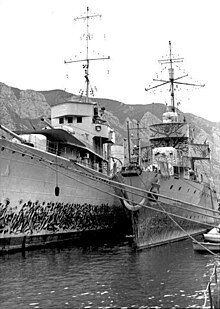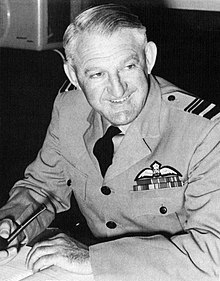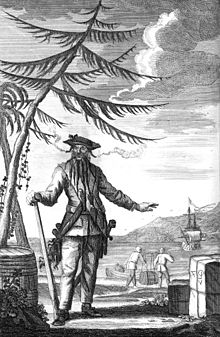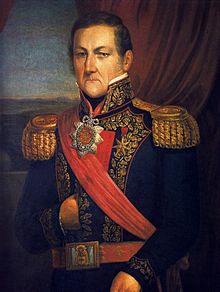Portal:History
The History Portal
History (derived from Ancient Greek ἱστορία (historía) 'inquiry; knowledge acquired by investigation') is the systematic study and documentation of the human past. History is an academic discipline which uses a narrative to describe, examine, question, and analyze past events, and investigate their patterns of cause and effect. Historians debate which narrative best explains an event, as well as the significance of different causes and effects. Historians debate the nature of history as an end in itself, and its usefulness in giving perspective on the problems of the present.
The period of events before the invention of writing systems is considered prehistory. "History" is an umbrella term comprising past events as well as the memory, discovery, collection, organization, presentation, and interpretation of these events. Historians seek knowledge of the past using historical sources such as written documents, oral accounts or traditional oral histories, art and material artifacts, and ecological markers.
Stories common to a particular culture, but not supported by external sources (such as the tales surrounding King Arthur), are usually classified as cultural heritage or legends. History differs from myth in that it is supported by verifiable evidence. However, ancient cultural influences have helped create variant interpretations of the nature of history, which have evolved over the centuries and continue to change today. The modern study of history is wide-ranging, and includes the study of specific regions and certain topical or thematic elements of historical investigation. History is taught as a part of primary and secondary education, and the academic study of history is a major discipline in universities.
Herodotus, a 5th-century BCE Greek historian, is often considered the "father of history", as one of the first historians in the Western tradition, though he has been criticized as the "father of lies". Along with his contemporary Thucydides, he helped form the foundations for the modern study of past events and societies. Their works continue to be read today, and the gap between the culture-focused Herodotus and the military-focused Thucydides remains a point of contention or approach in modern historical writing. In East Asia a state chronicle, the Spring and Autumn Annals, was reputed to date from as early as 722 BCE, though only 2nd-century BCE texts have survived. The title "father of history" has also been attributed, in their respective societies, to Sima Qian, Ibn Khaldun, and Kenneth Dike. (Full article...)
Featured picture
Did you know (auto generated)

- ... that the historic mansion Bulgur Palas in Istanbul hosted a birdhouse for hundreds of domestic canaries in one room during its ownership by the Ottoman Bank?
- ... that the Harlem Park Three were awarded US$48 million, the largest sum in Baltimore history, after being falsely imprisoned for murder?
- ... that pianist and composer Josef Weiss created the first film score in the history of German cinema?
- ... that neurologist Christopher J. Boes has discussed the history of treating headaches without drugs?
- ... that local regulation and law enforcement in Brighton's early history was carried out by the Society of Twelve, a beadle "in cocked hat and full regalia", and two "Old Charlies"?
- ... that Maggio di Accettura, a festival in Italy dedicated to the Christian martyr Saint Julian, might have pagan origins or be linked to Langobard history?
Juan Manuel José Domingo Ortiz de Rozas y López de Osornio (30 March 1793 – 14 March 1877), nicknamed "Restorer of the Laws", was an Argentine politician and army officer who ruled Buenos Aires Province and briefly the Argentine Confederation. Although born into a wealthy family, Rosas independently amassed a personal fortune, acquiring large tracts of land in the process. Rosas enlisted his workers in a private militia, as was common for rural proprietors, and took part in the disputes that led to numerous civil wars in his country. Victorious in warfare, personally influential, and with vast landholdings and a loyal private army, Rosas became a caudillo, as provincial warlords in the region were known. He eventually reached the rank of brigadier general, the highest in the Argentine Army, and became the undisputed leader of the Federalist Party.
In December 1829, Rosas became governor of the province of Buenos Aires and established a dictatorship backed by state terrorism. In 1831, he signed the Federal Pact, recognising provincial autonomy and creating the Argentine Confederation. When his term of office ended in 1832, Rosas departed to the frontier to wage war on the indigenous peoples. After his supporters launched a coup in Buenos Aires, Rosas was asked to return and once again took office as governor. Rosas reestablished his dictatorship and formed the repressive Mazorca, an armed parapolice that killed thousands of citizens. Elections became a farce, and the legislature and judiciary became docile instruments of his will. Rosas created a cult of personality and his regime became totalitarian in nature, with all aspects of society rigidly controlled. (Full article...)
On this day
November 20: Transgender Day of Remembrance
- 284 – Diocletian became Roman emperor, eventually establishing reforms that ended the Crisis of the Third Century.
- 1739 – War of Jenkins' Ear: A British naval force arrived at the settlement of Portobello in the Spanish Main, capturing it the next day.
- 1969 – A group of Native American activists began a 19-month occupation (graffiti pictured) of Alcatraz Island in San Francisco Bay.
- 1979 – Armed insurgents attacked and took over the Masjid al-Haram in Mecca, declaring that one of their leaders was the Mahdi, the prophesied redeemer of Islam.
- 1994 – In accordance with the Lusaka Protocol, the Angolan government signed a ceasefire with UNITA rebels in a failed attempt to end the Angolan Civil War.
- Carl Axel Arrhenius (d. 1824)
- Benoit Mandelbrot (b. 1924)
- Meredith Whitney (b. 1969)
- Ancel Keys (d. 2004)
Selected quote
My heart is a stone: heavy with sadness for my people; cold with the knowledge that no treaty will keep whites out of our lands; hard with the determination to resist as long as I live and breathe.
— Tecumseh, Native American tribal chief
Related portals
More Did you know...
- ... that the Japanese aircraft carrier Amagi (wreck pictured) capsized on 29 July 1945 as a result of cumulative damage inflicted by American airstrikes on 24 and 28 July?
- ... that Scandinavian influence in Scotland, still evident today, was probably at its height during the time of Thorfinn the Mighty?
- ... that, after the 2003 invasion of Iraq, the Bassetki statue, which is more than 4,200 years old, was found in a cesspool?
- ... that in medieval art, angels were often depicted wearing feather tights?
- ... that 49% of German military losses happened in the last 10 months of the Second World War in Europe?
- ... that Joshua L. Goldberg, the first rabbi to serve as a World War II U.S. navy chaplain, was a Russian army deserter?
- ... that Richard Nixon chose the Wilson desk as his Oval Office desk because he believed it was used by Woodrow Wilson, informed that it was used by Henry Wilson, Vice President under Ulysses S. Grant, but actually bought by Garret Augustus Hobart, 24th Vice President of the United States under President William McKinley?
- ... that some of the nominally silver Roman coins from the Bredon Hill Hoard only have a 1% silver content?
Topics
Categories

History • By period • By region • By topic • By ethnic group • Historiography • Archaeology • Books • Maps • Images • Magazines • Organizations • Fictional • Museums • Pseudohistory • Stubs • Timelines • Chronology • People • Wikipedia historians
WikiProjects
![]() WikiProject History •
Ancient Near East • Australian History • Classical Greece and Rome • Dacia • Former countries • History of Canada • Chinese history • European history • Heraldry and vexillology • Indian history • Jewish history • Medieval Scotland • Mesoamerica • Military history • Middle Ages • History of Science
WikiProject History •
Ancient Near East • Australian History • Classical Greece and Rome • Dacia • Former countries • History of Canada • Chinese history • European history • Heraldry and vexillology • Indian history • Jewish history • Medieval Scotland • Mesoamerica • Military history • Middle Ages • History of Science
WikiProject Time • Days of the Year • Years
WikiProject Biography • Composers • Political figures • Saints • United States Presidents
Things you can do
 |
Here are some tasks awaiting attention:
|
Associated Wikimedia
The following Wikimedia Foundation sister projects provide more on this subject:
-
Commons
Free media repository -
Wikibooks
Free textbooks and manuals -
Wikidata
Free knowledge base -
Wikinews
Free-content news -
Wikiquote
Collection of quotations -
Wikisource
Free-content library -
Wikiversity
Free learning tools -
Wiktionary
Dictionary and thesaurus

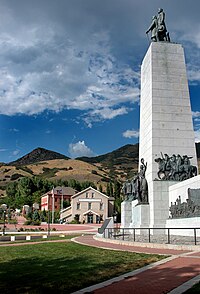
![Image 1 View of the Close of the Action Between the British and French Fleets, off Port L'Orient on 23 June 1795, Robert Dodd The Battle of Groix ([ɡʁwa], g'r-wah) was a large naval engagement which took place near the island of Groix off the Biscay coast of Brittany on 23 June 1795 (5 messidor an III) during the French Revolutionary Wars. The battle was fought between elements of the British Channel Fleet and the French Atlantic Fleet, which were cruising in the region on separate missions. The British fleet, commanded by Admiral Lord Bridport, was covering an invasion convoy carrying a French Royalist army to invade Quiberon, while the French under Vice-admiral Villaret de Joyeuse had sailed a week earlier to rescue a French convoy from attack by a British squadron. The French fleet had driven off the British squadron in a battle on 17 June known as Cornwallis's Retreat, and were attempting to return to their base at Brest when Bridport's force of 14 ships of the line appeared on 22 June. Villaret, believing that the stronger British fleet would destroy his own 12 ships of the line, ordered his force to fall back to the inshore anchorage off Groix, hoping to take shelter in protected coastal waters. Several of his ships were too slow, falling behind so that early in the morning of 23 June the rearmost ships of his fleet were caught by the British vanguard, overhauled one by one and brought to battle. Although Villaret fought a determined rearguard action, three French ships were captured, all with very heavy casualties, and the remainder of the French fleet was left scattered across miles of coastline. In this position they were highly vulnerable to continued British attack, but after only a few hours' engagement, concerned that his ships might be wrecked on the rocky coastline, Bridport called off the action and allowed Villaret to regroup inshore and retreat to Lorient. (Full article...)](http://upload.wikimedia.org/wikipedia/en/d/d2/Blank.png)

